|
|
|
Sort Order |
|
|
|
Items / Page
|
|
|
|
|
|
|
| Srl | Item |
| 1 |
ID:
185660
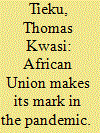

|
|
|
|
|
| Summary/Abstract |
A new spirit of pan-Africanism guided the continent’s response to the pandemic. Led by South African President Cyril Ramaphosa, the African Union provided multilateral coordination and worked with external partners to obtain support, while the Africa Centres for Disease Control and Prevention organized the pandemic responses of national public health agencies. The pandemic showed the risks of continued reliance on foreign donors for resources such as vaccines, but the collective response demonstrated that the AU has become a strong institution capable of addressing regional and global challenges.
|
|
|
|
|
|
|
|
|
|
|
|
|
|
|
|
| 2 |
ID:
078437
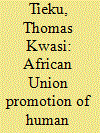

|
|
|
| 3 |
ID:
069331
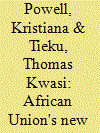

|
|
|
| 4 |
ID:
051895


|
|
|
|
|
| Publication |
April 2004.
|
| Summary/Abstract |
The rapid creation of the African Union (AU) has been described as one of the most puzzling events in interstate co-operation in contemporary Africa. While studies published so far on the subject express surprise at the AU's speedy creation, none makes any attempt to explain the clash of interests and ideas of the key actors and how they were accommodated in order to create the AU. This article attempts to fill this gap by exploring the interests and ideas that drove the AU process. It argues that the introduction at the Algiers summit in 1999 of two separate reform packages that were meant to reform the OAU in line with the foreign policy interests of Nigeria and South Africa set in motion the process that eventually led to the creation of the AU.
|
|
|
|
|
|
|
|
|
|
|
|
|
|
|
|
| 5 |
ID:
187042
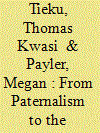

|
|
|
|
|
| Summary/Abstract |
This article explores the working relationship between the United Nations (UN), African Union (AU), and the Economic Community of West African States (ECOWAS) in mediating conflicts in West Africa and the Sahel regions. We argue that through the United Nations Office for West Africa and the Sahel (UNOWAS), the UN, ECOWAS and the AU are working on mediation efforts to transcend traditional conceptualizations of the relationship between the world body and regional organizations. We show that the partnership is grounded on the logic of subsidiarity, informality, elite networks, technical competence, soft skills, and robust social trust. For heuristic purposes, we call the six principles the Chambas Formula, with reference to the centrality of the Special Representative of the Secretary-General for West Africa and the Sahel, Mohamed Ibn Chambas, and the emergence and consistent application of the principles in the mediation setting in West Africa and the Sahel regions.
|
|
|
|
|
|
|
|
|
|
|
|
|
|
|
|
| 6 |
ID:
183221
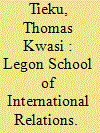

|
|
|
|
|
| Summary/Abstract |
The article explores the Legon School of International Relations (LSIR) which is the research, teaching, and academic programming of International Relations (IR) at the University of Ghana, Legon. The LSIR came out of attempts to decolonise knowledge production, dissemination, and academic programing in Ghana in early 1960s. The article shows that the LSIR is decolonial in theoretical perspective, grounded in southern epistemologies, relational in ontology, qualitative in methodology, practice-based, and it is equity-oriented. Although the LSIR scholarship as a package is distinctive, some of its ideas overlap with the work of several contemporary IR communities in the West. The article highlights implications of the LSIR story for the IR communities in the West and the value of paying close attention to the works of IR centres of scholarship in Africa.
|
|
|
|
|
|
|
|
|
|
|
|
|
|
|
|
| 7 |
ID:
176492
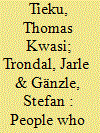

|
|
|
|
|
| Summary/Abstract |
This study contributes to the field of International Public Administration (IPA) and the emerging area of Informal International Relations (IIR) by examining the politics of staffing and recruitment of the African Union Commission (AUC). Although the AUC has become a major political player in international affairs, there is a dearth of knowledge about the civil servants who work for the AUC and who run this paramount pan-African executive body. To address the void, this paper draws on a survey of 137 AUC staff, archival studies and interviews to explore recruitment of AUC staff. Combining organisational theory and informality as analytical lenses, the study demonstrates that, first, many informal international practices (IIPs) are embedded in AUC recruitment processes. Second, the AUC is composed largely of short-term, contracted staff. Finally, it shows that the AUC is dependent on lower-ranked personnel or that it is bottom-heavy. Many of these lower-ranked officials are intimately involved in the making of AUC policies and decisions, putting into question the assumption in existing scholarship that decision-makers of IOs are primarily reliant on top-ranked A-level officials (senior management).
|
|
|
|
|
|
|
|
|
|
|
|
|
|
|
|
| 8 |
ID:
123173
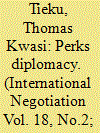

|
|
|
|
|
| Publication |
2013.
|
| Summary/Abstract |
Abstract This article examines impacts of luxurious perks, such as paid daily allowances on peace talks. It draws on the case of the Burundian peace processes held in Arusha, Tanzania and the Seventh Round of the Inter-Sudanese Peace Talks held in Abuja, Nigeria to show that perks can unintentionally prolong peace talks. Perks bestowed on delegates to the talks seduced the conflicting parties away from whatever interest they might have had in actually reaching an agreement. For some, living free of charge in five-star hotels and receiving the equivalent of five months' pay in one week of per diems made continued talks more attractive than achieving peace. Many of the feuding parties found the perks of greater value for their effort - or rather, lack thereof - and they shared an incentive to keep the talks going.
|
|
|
|
|
|
|
|
|
|
|
|
|
|
|
|
| 9 |
ID:
166753


|
|
|
|
|
| Summary/Abstract |
Informality is a fact of international life. Plethora of unwritten rules, unofficial processes, informal meetings, unconventional practices, and ad hoc bodies govern the international system. Interviews, memoirs, narratives, and other forms of communication by seasoned diplomats all point to the fact that decisions that have consequential impacts on international politics are taken in informal settings, and numerous studies show that informal institutions fundamentally shape domestic political life. Yet, systematic and explicit accounts of the nature and functions of informal international rules (IIRs) is rare in international relations (IR) scholarship. The oversight means that we are left with many unanswered questions regarding the manner in which informal rules exist and interact in the international system and, in turn, how they shape international political outcomes. This article addresses this gap in knowledge by outlining core characteristics of IIRs and their functions in international political life. The analysis shows that key IIRs are embedded in formal institutions. Thus, while IIRs are distinct from formal international rules and should be studied in their own right, it will be a fundamental error to approach informal rules with a binary mindset.
|
|
|
|
|
|
|
|
|
|
|
|
|
|
|
|
|
|
|
|
|